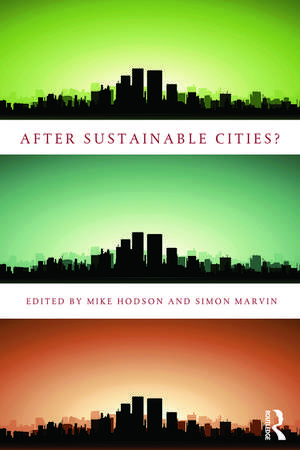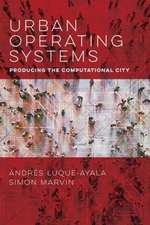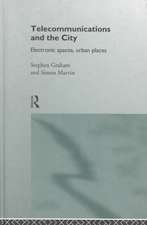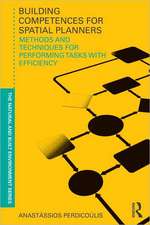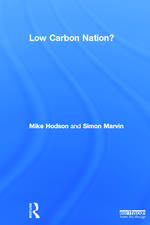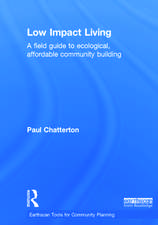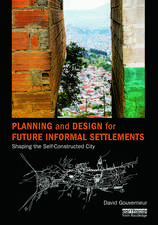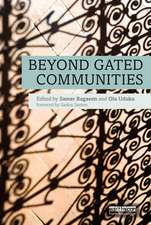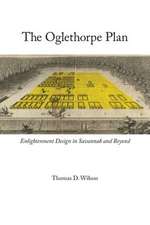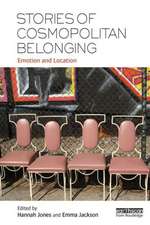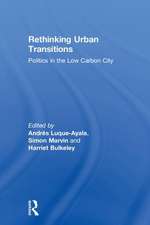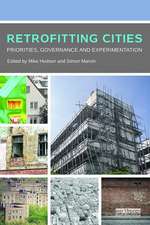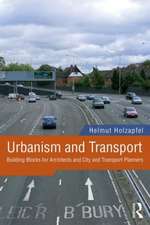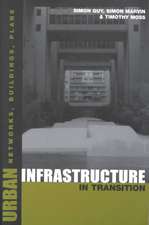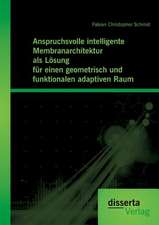After Sustainable Cities?
Editat de Mike Hodson, Simon Marvinen Limba Engleză Paperback – 24 apr 2014
After Sustainable Cities critically reviews what has happened to these priorities and asks whether these social commitments have been abandoned in a period of austerity governance and climate change and replaced by a darker and unfair city. This book provides the first comprehensive and comparative analysis of the new eco-logics reshaping conventional sustainable cities discourse and environmental priorities of cities in both the global north and south. The dominant discourse on sustainable cities, with a commitment to intergenerational equity, social justice and global responsibility, has come under increasing pressure. Under conditions of global ecological change, international financial and economic crisis and austerity governance new eco-logics are entering the urban sustainability lexicon – climate change, green growth, smart growth, resilience and vulnerability, ecological security. This book explores how these new eco-logics reshape our understanding of equity, justice and global responsibility, and how these more technologically and economically driven themes resonate and dissonate with conventional sustainable cities discourse. This book provides a warning that a more technologically driven and narrowly constructed economic agenda is driving ecological policy and weakening previous commitment to social justice and equity.
After Sustainable Cities brings together leading researchers to provide a critical examination of these new logics and identity what sort of city is now emerging, as well as consider the longer-term implication on sustainable cities research and policy.
| Toate formatele și edițiile | Preț | Express |
|---|---|---|
| Paperback (1) | 441.74 lei 6-8 săpt. | |
| Taylor & Francis – 24 apr 2014 | 441.74 lei 6-8 săpt. | |
| Hardback (1) | 997.11 lei 6-8 săpt. | |
| Taylor & Francis – 24 apr 2014 | 997.11 lei 6-8 săpt. |
Preț: 441.74 lei
Nou
Puncte Express: 663
Preț estimativ în valută:
84.54€ • 91.79$ • 71.01£
84.54€ • 91.79$ • 71.01£
Carte tipărită la comandă
Livrare economică 22 aprilie-06 mai
Preluare comenzi: 021 569.72.76
Specificații
ISBN-13: 9780415659871
ISBN-10: 0415659876
Pagini: 158
Ilustrații: 11 black & white tables
Dimensiuni: 156 x 234 x 15 mm
Greutate: 0.27 kg
Ediția:New.
Editura: Taylor & Francis
Colecția Routledge
Locul publicării:Oxford, United Kingdom
ISBN-10: 0415659876
Pagini: 158
Ilustrații: 11 black & white tables
Dimensiuni: 156 x 234 x 15 mm
Greutate: 0.27 kg
Ediția:New.
Editura: Taylor & Francis
Colecția Routledge
Locul publicării:Oxford, United Kingdom
Public țintă
Postgraduate and UndergraduateCuprins
1. Introduction 2. Disasters, Vulnerability and Resilience of Cities 3. A Green New Deal: Why Green, How New, and What is the Deal? 4. Carbon Regulation and Low-Carbon Urban Restructuring 5. Urban Decoupling and Transitions Analysis 6. Smart Urbanism: Cities, Grids and Alternatives? 7. Securitisation of Urban Environments: Sustainable Urbanism or Premium Ecological Enclaves? 8. The Politics of Urban Experiments: Radical Change or Business as Usual? 9. Conclusion References
Descriere
After Sustainable Cities provides the reader with the first comprehensive, critical and comparative analysis of the new eco-logics reshaping conventional sustainable cities discourse. It brings together leading researchers on smart cities, green growth, resource flows, vulnerability and resilience, ecological security and climate change who critically examine how these new eco-logics are reshaping the environmental priorities of cities in both the global north and south. Each chapter carefully considers what these new logics do to the original precepts of sustainable cities and identify what sort of city is now emerging. After Sustainable Cities provides a warning that a much darker more technologically driven and narrowly constructed economic agenda is driving ecological policy and weakening previous commitment to social justice and equity.
